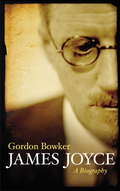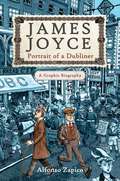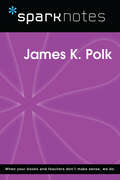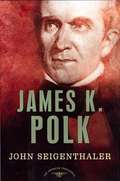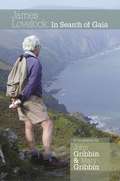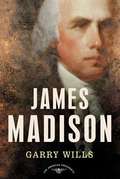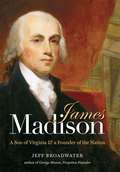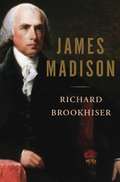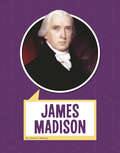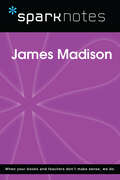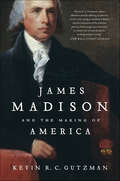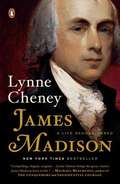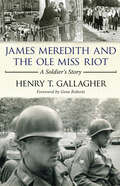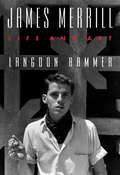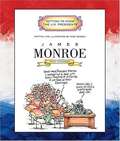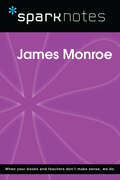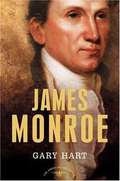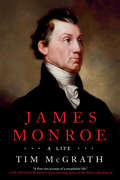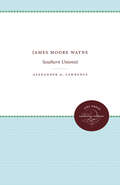- Table View
- List View
James Joyce: A Biography
by Gordon BowkerLong-awaited and comprehensive biography of the great Irish author James JoyceJames Joyce was one of the greatest writers of the twentieth century, but he was not immediately recognised as such; rather he lived in exile in the cosmopolitan Europe of the 1920s in a bid to escape the suffocating atmosphere and parochial prejudices of his native Dublin. His unstinting dedication to authorship picks him out as a writer in the romantic tradition. He battled poverty and financial dependency for much of his adult life, as well as near-blindness from 1917 and the grief of his daughter Lucia's mental illness. He suffered too the slings and arrows of uncomprehending critics especially for his influential Ulysses, which was banned in both Britain and America. Drawing on considerable new material that has only recently become available, Gordon Bowker's biography attempts to get beyond the exterior life to explore the inner landscape of an extraordinary writer who continues to influence and fascinate, well over a century after his birth.
James Joyce: Portrait of a Dubliner—A Graphic Biography
by Alfonso ZapicoA dazzling, prize-winning graphic biography of one of the world's most revered writers. Winner of Spain's National Comic Prize and published to acclaim in Ireland, here is an extraordinary graphic biography of James Joyce that offers a fresh take on his tumultuous life. With evocative anecdotes and hundreds of ink-wash drawings, Alfonso Zapico invites the reader to share Joyce's journey, from his earliest days in Dublin to his life with his great love, Nora Barnacle, and their children, and his struggles and triumphs as an artist. Joyce experienced poverty, rejection, censorship, charges of blasphemy and obscenity, war, and crippling ill-health. A rebel and nonconformist in Dublin and a harsh critic of Irish society, he left Ireland in self-imposed exile with Nora, moving to Paris, Pola, Trieste, Rome, London, and finally Zurich. He overcame monumental challenges in creating and publishing Dubliners, Portrait of an Artist as a Young Man, Ulysses, and Finnegan's Wake. Along the way, he encountered a colorful cast of characters, from the Irish nationalists Charles Parnell and Michael Collins to literary greats Yeats, Proust, Hemingway, and Beckett, and the likes of Carl Jung and Vladimir Lenin.
James K. Polk (SparkNotes Biography Guide)
by SparkNotesJames K. Polk (SparkNotes Biography Guide) Making the reading experience fun! SparkNotes Biography Guides examine the lives of historical luminaries, from Alexander the Great to Virginia Woolf. Each biography guide includes:An examination of the historical context in which the person lived A summary of the person&’s life and achievements A glossary of important terms, people, and events An in-depth look at the key epochs in the person&’s career Study questions and essay topics A review test Suggestions for further reading Whether you&’re a student of history or just a student cramming for a history exam, SparkNotes Biography guides are a reliable, thorough, and readable resource.
James K. Polk (The American Presidents Series)
by Arthur M. Schlesinger John SeigenthalerJames K. Polk was a shrewd and decisive commander-in-chief, the youngest president elected to guide the still-young nation, who served as Speaker of the House and governor of Tennessee before taking office in 1845. Considered a natural successor to Andrew Jackson, 'Young Hickory' miraculously revived his floundering political career by riding a wave of public sentiment in favor of annexing the Republic of Texas to the Union. Shortly after his inauguration, he settled the disputed Oregon boundary and by 1846 had declared war on Mexico in hopes of annexing California. The considerably smaller American army never lost a battle. At home, however, Polk suffered a political firestorm of antiwar attacks from many fronts. Despite his tremendous accomplishments, he left office an extremely unpopular man, on whom stress had taken such a physical toll that he died within three months of departing Washington. Fellow Tennessean John Seigenthaler traces the life of this president who, as Truman noted, 'said what he intended to do and did it.'
James Lovelock: In Search of Gaia
by John Gribbin Mary GribbinIn 1972, when James Lovelock first proposed the Gaia hypothesis--the idea that the Earth is a living organism that maintains conditions suitable for life--he was ridiculed by the scientific establishment. Today Lovelock's revolutionary insight, though still extremely controversial, is recognized as one of the most creative, provocative, and captivating scientific ideas of our time. James Lovelock tells for the first time the whole story of this maverick scientist's life and how it served as a unique preparation for the idea of Gaia. Drawing on in-depth interviews with Lovelock himself and unprecedented access to his private papers, John and Mary Gribbin paint an intimate and fascinating portrait of a restless, uniquely gifted freethinker. In a lifetime spanning almost a century, Lovelock has followed a career path that led him from chemistry, to medicine, to engineering, to space science. He worked for the British secret service and contributed to the success of the D-Day landings in World War II. He was a medical experimenter and an accomplished inventor. And he was working with NASA on methods for finding possible life on Mars when he struck upon the idea of Gaia, conceiving of the Earth as a vast, living, self-regulating system. Deftly framed within the context of today's mounting global-warming crisis, James Lovelock traces the intertwining trajectories of Lovelock's life and the famous idea it brought forth, which continues to provoke passionate debate about the nature and future of life on our planet.
James Madison
by Garry WillsA bestselling historian examines the life of a Founding Father.Renowned historian and social commentator Garry Wills takes a fresh look at the life of James Madison, from his rise to prominence in the colonies through his role in the creation of the Articles of Confederation and the first Constitutional Congress. Madison oversaw the first foreign war under the constitution, and was forced to adjust some expectations he had formed while drafting that document. Not temperamentally suited to be a wartime President, Madison nonetheless confronted issues such as public morale, internal security, relations with Congress, and the independence of the military. Wills traces Madison's later life during which, like many recent Presidents, he enjoyed greater popularity than while in office.
James Madison
by Jeff BroadwaterJames Madison is remembered primarily as a systematic political theorist, but this bookish and unassuming man was also a practical politician who strove for balance in an age of revolution. In this biography, Jeff Broadwater focuses on Madison's role in the battle for religious freedom in Virginia, his contributions to the adoption of the Constitution and the Bill of Rights, his place in the evolution of the party system, his relationship with Dolley Madison, his performance as a wartime commander in chief, and his views on slavery. From Broadwater's perspective, no single figure can tell us more about the origins of the American republic than our fourth president.In these pages, Madison emerges as a remarkably resilient politician, an unlikely wartime leader who survived repeated setbacks in the War of 1812 with his popularity intact. Yet Broadwater shows that despite his keen intelligence, the more Madison thought about one issue, race, the more muddled his thinking became, and his conviction that white prejudices were intractable prevented him from fully grappling with the dilemma of American slavery.
James Madison
by Richard BrookhiserJames Madison led one of the most influential and prolific lives in American history, and his story-although all too often overshadowed by his more celebrated contemporaries-is integral to that of the nation. Madison helped to shape our country as perhaps no other Founder: collaborating on the Federalist Papers and the Bill of Rights, resisting government overreach by assembling one of the nation's first political parties (the Republicans, who became today's Democrats), and taking to the battlefield during the War of 1812, becoming the last president to lead troops in combat. In this penetrating biography, eminent historian Richard Brookhiser presents a vivid portrait of the "Father of the Constitution," an accomplished yet humble statesman who nourished Americans' fledgling liberty and vigorously defended the laws that have preserved it to this day.
James Madison (Biographies)
by Laura K. MurrayHow much do you know about James Madison? Find out the facts you need to know about the fourth president of the United States. You'll learn about the early life, challenges, and major accomplishments of this important American.
James Madison (SparkNotes Biography Guide)
by SparkNotesJames Madison (SparkNotes Biography Guide) Making the reading experience fun! SparkNotes Biography Guides examine the lives of historical luminaries, from Alexander the Great to Virginia Woolf. Each biography guide includes:An examination of the historical context in which the person lived A summary of the person&’s life and achievements A glossary of important terms, people, and events An in-depth look at the key epochs in the person&’s career Study questions and essay topics A review test Suggestions for further reading Whether you&’re a student of history or just a student cramming for a history exam, SparkNotes Biography guides are a reliable, thorough, and readable resource.
James Madison and Constitutional Imperfection
by Jeremy D. BaileyThis book presents a provocative account of James Madison's political thought by focusing on Madison's lifelong encounter with the enduring problem of constitutional imperfection. In particular, it emphasizes Madison's alliance with Thomas Jefferson, liberating it from those long-standing accounts of Madisonian constitutionalism that emphasize deliberation by elites and constitutional veneration. Contrary to much of the scholarship, this book shows that Madison was aware of the limits of the inventions of political science and held a far more subtle understanding of the possibility of constitutional government than has been recognized. By repositioning Madison as closer to Jefferson and the Revolution of 1800, this book offers a reinterpretation of one of the central figures of the early republic.
James Madison and the Making of America
by Kevin R. GutzmanIn James Madison and the Making of America, historian Kevin Gutzman looks beyond the way James Madison is traditionally seen -- as "The Father of the Constitution" -- to find a more complex and sometimes contradictory portrait of this influential Founding Father and the ways in which he influenced the spirit of today's United States. Instead of an idealized portrait of Madison, Gutzman treats readers to the flesh-and-blood story of a man who often performed his founding deeds in spite of himself: Madison's fame rests on his participation in the writing of The Federalist Papers and his role in drafting the Bill of Rights and Constitution. Today, his contribution to those documents is largely misunderstood. He thought that the Bill of Rights was unnecessary and insisted that it not be included in the Constitution, a document he found entirely inadequate and predicted would soon fail. Madison helped to create the first American political party, the first party to call itself "Republican", but only after he had argued that political parties, in general, were harmful. Madison served as Secretary of State and then as President during the early years of the United States and the War of 1812; however, the American foreign policy he implemented in 1801-1817 ultimately resulted in the British burning down the Capitol and the White House. In so many ways, the contradictions both in Madison's thinking and in the way he governed foreshadowed the conflicted state of our Union now. His greatest legacy—the disestablishment of Virginia's state church and adoption of the libertarian Virginia Statute for Religious Freedom—is often omitted from discussion of his career. Yet, understanding the way in which Madison saw the relationship between the church and state is key to understanding the real man. Kevin Gutzman's James Madison and the Making of America promises to become the standard biography of our fourth President.
James Madison: A Life Reconsidered
by Lynne Cheney<P>A major new biography of the fourth president of the United States by New York Times bestselling author Lynne Cheney <P>This majestic new biography of James Madison explores the astonishing story of a man of vaunted modesty who audaciously changed the world. Among the Founding Fathers, Madison was a true genius of the early republic. <P>Outwardly reserved, Madison was the intellectual driving force behind the Constitution and crucial to its ratification. His visionary political philosophy and rationale for the union of states--so eloquently presented in The Federalist papers--helped shape the country Americans live in today. Along with Thomas Jefferson, Madison would found the first political party in the country's history--the Democratic Republicans. <P>As Jefferson's secretary of state, he managed the Louisiana Purchase, doubling the size of the United States. As president, Madison led the country in its first war under the Constitution, the War of 1812. Without precedent to guide him, he would demonstrate that a republic could defend its honor and independence--and remain a republic still. <P><b>A New York Times Bestseller</b>
James Madison: America's First Politician
by Jay CostAn intellectual biography of James Madison, arguing that he invented American politics as we know it How do you solve a problem like James Madison? The fourth president is one of the most confounding figures in early American history; his political trajectory seems almost intentionally inconsistent. He was both for and against a strong federal government. He wrote about the dangers of political parties in the Federalist Papers and then helped to found the Republican Party just a few years later. This so-called Madison problem has occupied scholars for ages. As Jay Cost shows in this incisive new biography, the underlying logic of Madison&’s seemingly mixed record comes into focus only when we understand him primarily as a working politician. Whereas other founders split their time between politics and other vocations, Madison dedicated himself singularly to the work of politics and ultimately developed it into a distinctly American idiom. He was, in short, the first American politician.
James Madison: Fourth President Of The United States
by Barbara Garland PolikoffTraces the childhood, education, employment, political career, and presidency of the statesman from Virginia.
James Meredith and the Ole Miss Riot: A Soldier's Story
by Henry T. GallagherIn September 1962, James Meredith became the first African American admitted to the University of Mississippi. A milestone in the civil rights movement, his admission triggered a riot spurred by a mob of three thousand whites from across the South and all but officially stoked by the state's segregationist authorities. Historians have called the Oxford riot nothing less than an insurrection and the worst constitutional crisis since the Civil War. The escalating conflict prompted President John F. Kennedy to send twenty thousand regular army troops, in addition to federalized Mississippi National Guard soldiers, into the civil unrest (ten thousand into the town itself) to quell rioters and restore law and order. James Meredith and the Ole Miss Riot is the memoir of one of the participants, a young army second lieutenant named Henry Gallagher, born and raised in Minnesota. His military police battalion from New Jersey deployed, without the benefit of riot-control practice or advance briefing, into a deadly civil rights confrontation. He was thereafter assigned as the officer-in-charge of Meredith's security detail at a time when he faced very real threats to his life. Gallagher's first-person account considers the performance of his fellow soldiers before and after the riot. He writes of the behavior of the white students, some of them defiant, others perceiving a Communist-inspired Kennedy conspiracy in Meredith's entry into Mississippi's “flagship” university. The author depicts the student, Meredith, a man who at times seemed disconnected with the violent reality that swirled around him, and who even aspired to be freed of his protectors so that he could just be another Ole Miss student. James Meredith and the Ole Miss Riot is both an invaluable perspective on a pivotal moment in American history and an in-depth look at a unique home front military action. From the vantage of the fiftieth anniversary of the riot, Henry T. Gallagher reveals the young man he was in the midst of one of history's most profound tests, a soldier from the Midwest encountering the powder keg of the Old South and its violent racial divisions.
James Merrill
by Langdon HammerLangdon Hammer has given us the first biography of the poet James Merrill (1926-95), whose life is surely one of the most fascinating in American literature. Merrill was born to high privilege and high expectations as the son of Charles Merrill, the charismatic cofounder of the brokerage firm Merrill Lynch, and Hellen Ingram, a muse, ally, and antagonist throughout her son's life. Wounded by his parents' bitter divorce, he was the child of a broken home, looking for repair in poetry and love. This is the story of a young man escaping, yet also reenacting, the energies and obsessions of those powerful parents. It is the story of a gay man inventing his identity against the grain of American society during the eras of the closet, gay liberation, and AIDS. Above all, it is the story of a brilliantly gifted, fiercely dedicated poet working every day to turn his life into art. After college at Amherst and a period of adventure in Europe, Merrill returned to the New York art world of the 1950s (he was friendly with W. H. Auden, Maya Deren, Truman Capote, Larry Rivers, Elizabeth Bishop, and other midcentury luminaries) and began publishing poems, plays, and novels. In 1953, he fell in love with an aspiring writer, David Jackson. They explored "boys and bars" as they made their life together in Connecticut and later in Greece and Key West. At the same time, improbably, they carried on a forty-year conversation with spirits of the Other World by means of a Ouija board. The board became a source of poetic inspiration for Merrill, culminating in his prizewinning, uncanny, one-of-a-kind work The Changing Light at Sandover. In his virtuosic poetry and in the candid letters and diaries that enrich every page of this deliciously readable life, Merrill created a prismatic art of multiple perspectives and comic self-knowledge, expressing hope for a world threatened by nuclear war and environmental catastrophe. Holding this life and art together in a complex, evolving whole, Hammer illuminates Merrill's "chronicles of love & loss" and the poignant personal journey they record.From the Hardcover edition.
James Monroe (SparkNotes Biography Guide)
by SparkNotesJames Monroe (SparkNotes Biography Guide) Making the reading experience fun! SparkNotes Biography Guides examine the lives of historical luminaries, from Alexander the Great to Virginia Woolf. Each biography guide includes:An examination of the historical context in which the person lived A summary of the person&’s life and achievements A glossary of important terms, people, and events An in-depth look at the key epochs in the person&’s career Study questions and essay topics A review test Suggestions for further reading Whether you&’re a student of history or just a student cramming for a history exam, SparkNotes Biography guides are a reliable, thorough, and readable resource.
James Monroe (The American Presidents Series)
by Gary HartThe actions and priorities of James Monroe are portrayed here. He is described as a president ahead of his time whose priority in setting up America's national security has a great deal in common with chief executives of our own time.
James Monroe: 5th President Of The United States
by Rebecca StefoffProfiles the early life, career, family, and contributions of the fifth president of the United States.
James Monroe: A Life
by Tim McGrathThe extraordinary life of James Monroe: soldier, senator, diplomat, and the last Founding Father to hold the presidency, a man who helped transform thirteen colonies into a vibrant and mighty republic.&“A first-rate account of a remarkable life.&”—Jon Meacham, Pulitzer Prize-winning author of The Soul of America Monroe lived a life defined by revolutions. From the battlefields of the War for Independence, to his ambassadorship in Paris in the days of the guillotine, to his own role in the creation of Congress's partisan divide, he was a man who embodied the restless spirit of the age. He was never one to back down from a fight, whether it be with Alexander Hamilton, with whom he nearly engaged in a duel (prevented, ironically, by Aaron Burr), or George Washington, his hero turned political opponent. This magnificent new biography vividly recreates the epic sweep of Monroe&’s life: his near-death wounding at Trenton and a brutal winter at Valley Forge; his pivotal negotiations with France over the Louisiana Purchase; his deep, complex friendships with Thomas Jefferson and James Madison; his valiant leadership when the British ransacked the nation&’s capital and burned down the Executive Mansion; and Monroe&’s lifelong struggle to reckon with his own complicity in slavery. Elected the fifth president of the United States in 1816, this fiercest of partisans sought to bridge divisions and sow unity, calming turbulent political seas and inheriting Washington's mantle of placing country above party. Over his two terms, Monroe transformed the nation, strengthening American power both at home and abroad. Critically-acclaimed author Tim McGrath has consulted an extensive array of primary sources, many rarely seen since Monroe's own time, to conjure up this fascinating portrait of an essential American statesman and president.
James Moore Wayne: Southern Unionist
by Alexander A. LawrenceSouthern aristocrat, mayor of Savannah, congressman for three terms, justice of the Supreme Court of the United States, James Moore Wayne made love of the federal union the governing principle of his political and judicial career. Here is shown the impact of this southern unionist upon the Supreme Court during the critical period from 1835 to 1867.Originally published in 1943.A UNC Press Enduring Edition -- UNC Press Enduring Editions use the latest in digital technology to make available again books from our distinguished backlist that were previously out of print. These editions are published unaltered from the original, and are presented in affordable paperback formats, bringing readers both historical and cultural value.
James Nasmyth: Engineer - an Autobiography
by Samuel Smiles James NasmythAutobiography of the mechanical inventor
James Otis the Pre-revolutionist
by John Clark RidpathTHE LIFE OF AN IMPORTANT BUT NEGLECTED PARTICIPANT IN THE aMERICAN REVOLUTION.
